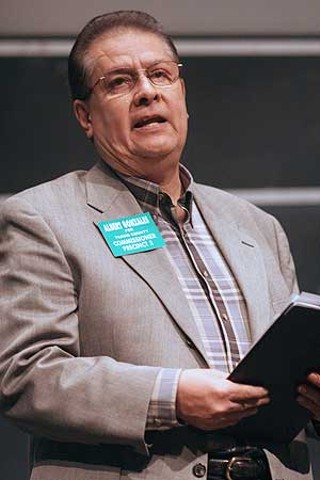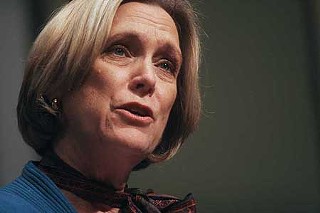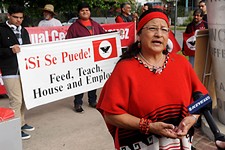Dems Hunting Daugherty in Precinct 3
Dems Hunting Daugherty in Precinct 3, Voting Rolls Mystery Part 2: The County's Side, and Voter ID Bill Redux
By Lee Nichols, Fri., Feb. 1, 2008

Nov. 5, 2002, was a heady day for Travis County Republicans. Statewide, the "GOP tidal wave" had seized control of Texas, and Travis had been a part of it: Redistricting had accomplished its goal, with half of the county's six-member House delegation going to the Republicans. Included in this toll was Travis Co. Commissioners Court Precinct 3 – on election night, mass-transit opponent and road-building proponent Gerald Daugherty triumphantly entered the county's vote-counting headquarters leading a parade of Republican supporters chanting, "No more traffic!" after he had unseated Democrat Margaret Moore.
Certainly, the western and northern sectors of the county have always countered the notion of Travis Co. as a Democratic fortress – Moore's incumbency had only been through appointment, replacing Republican commissioner turned state Rep. Todd Baxter, and in 2004, no Dem even challenged Daugherty's re-election to a full term. But consider the scene six years later: The Travis House delegation is once again all blue, and the Precinct 3 constabulary is under Dem Richard McCain. There are now only three GOP officials in office: Precinct 2 Justice of the Peace Barbara Bembry, Precinct 2 Constable Bob Vann, and Daugherty.
Republicans are now the hunted, and two Democrats view Daugherty as their prey. Albert Gonzales and Karen Huber are ready to make road warrior Daugherty hit the road. But first, they must battle each other in the March 4 primary. It should be an interesting race, because the two have taken strikingly different routes to candidacy.
Huber is not only a newbie to politics; she's also a latecomer to her own party. Until just a couple of years ago, she considered herself a Republican. Now she's on the other side of the ticket, billing herself as an environmentalist. "My family thought they were Republican," Huber says. More accurately, she says, they weren't really involved in party politics and tended to vote independently. "That's kind of the way I was raised, and in my adult life, when I wasn't active in anything, I thought I was [Republican]." However, "I've always had a problem with the Republican Party's position on the environment." A native Texan and University of Texas grad, she held a series of jobs around the nation in the real estate industry (including, notably, ClubCorp – but not, she says, with the arm of the company that manages the infamous Barton Creek Country Club), then moved back to Austin in 1995, getting a job with the Nature Conservancy and getting involved in water issues, including the Lower Colorado River Authority pipeline planned for Hamilton Pool Road. After a "slow conversion" and even giving campaign money to Daugherty, a friend of her husband's, "I'm going, 'Wait a minute – I think I know what my core values are.'" Now, she describes herself as a "zealot convert."
That isn't good enough for Gonzales, a retired human-resources worker with Progressive insurance and the founder of the Southwest Austin Democrats. "I've been a Democrat for 46 years," he says, and that's a major part of his pitch to the party faithful. "I've been a loyal, dedicated Democrat, and I understand the party's mission to serve the working class. ... She says she was raised Republican and started getting involved in issues 12 years ago; then why did she vote Republican for the past 12 years? She can't blame that on her parents. She's 61 years old. She needs to take responsibility for the last 12."
The two candidates equally recognize the major issue facing Precinct 3: growth. That's an issue for the entire region, but nowhere are its effects more critical than in the western half of the county. And both are acutely aware that state law severely hamstrings the ability of county governments to regulate growth. "I know we can't just literally go in there and say, 'Hey, stop all this development,'" Gonzales says. "We have to respect the rights of the property owners. But I believe the property owners and the developers, if we deliver the message right to them, they'll sit down with us. But we have to sit down with them and tell them, 'Hey, look what we're doing to the environment.' ... What is Austin and the surrounding area going to look like 20 years from now? Do we want it to look that way? Most of those developers and landowners live here, and I don't think they want to destroy that beautiful Hill Country." Gonzales said possibly arranging for clusters of "enterprise zones" could allow profit while protecting the environment.
Huber sounds similar themes of collaborating on issues while trying to manage growth. "All the stakeholders who have a vested interest in the outcome should be at the table and looking toward the solutions, along with all the experts that bring the technical information. Quite often the residents have a better feel for how to solve a problem than the experts."
When Huber was with the consulting firm Resource Management International, "[The Texas Department of Transportation] in the early 1980s was having so much litigation on construction projects that it was driving costs off the charts, so they implemented what was called a partnering program. Any TxDOT contract for over $250,000 was required to have a collaborative planning process with all the major stakeholders – the subcontractors, the landowners, everybody." Huber says the experience in that process will serve her well on the Commissioners Court. One legal possibility she suggests to manage growth is to explore using more stringently those provisions of state law that empower county governments to protect the public's health and safety, by applying that principle to the traffic and environmental impacts caused by developments.
Both candidates charge that incumbent Daugherty is failing to put citizens on the same footing as developers and road builders – an argument to be revisited by the primary winner in the fall campaign. "He has no respect for the taxpayers," Gonzales says. "YouTube a CAMPO meeting. [The Capital Area Metropolitan Planning Organization, on which Daugherty sits, is the major transportation-planning body for the region.] He chews out his constituents. He's forgotten that he is the employee."
Huber has firsthand experience with Daugherty. While working on behalf of Scenic Texas to try to get counties greater controls over billboards last session, she says the commissioner interfered with those efforts. "When an urbanizing county like Travis County has a commissioner that either testifies or either sends his person to testify and who quotes his name and says, 'We don't need this,' or 'We don't want this,' it makes a difference. ... It really hurts the process."
This correction ran in the February 8, 2008 issue:
In last week's "Dems Hunting Daugherty in Precinct 3," we reported that Travis Co. Commissioner Gerald Daugherty interfered with the efforts of Karen Huber and Scenic Texas to allow counties greater controls over billboards in the last legislative session. That was incorrect – in fact, Daugherty supported those efforts. That statement was followed by this quote from Huber: "When an urbanizing county like Travis County has a commissioner that either testifies or either sends his person to testify and who quotes his name and says, 'We don't need this,' or 'We don't want this,' it makes a difference. ... It really hurts the process." While the quote is correct, it actually referred to what Huber said was Daugherty's opposition to Rep. Patrick Rose's bill to give more land-use authority to counties, not the billboard issue. The Chronicle regrets the error.
Got something to say on the subject? Send a letter to the editor.











